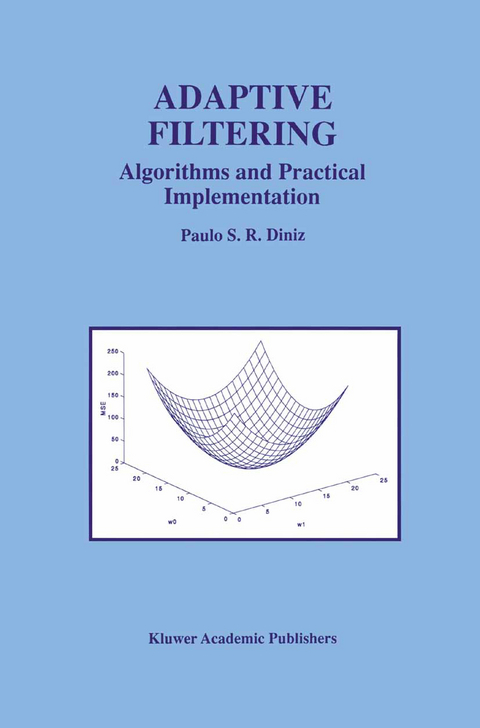
Adaptive Filtering
Algorithms and Practical Implementation
Seiten
2012
|
Softcover reprint of the original 1st ed. 1997
Springer-Verlag New York Inc.
978-1-4613-4660-9 (ISBN)
Springer-Verlag New York Inc.
978-1-4613-4660-9 (ISBN)
The field of Digital Signal Processing has developed so fast in the last two decades that it can be found in the graduate and undergraduate programs of most universities. If accurate information of the signals to be processed is available, the designer can easily choose the most appropriate algorithm to process the signal.
The field of Digital Signal Processing has developed so fast in the last two decades that it can be found in the graduate and undergraduate programs of most universities. This development is related to the growing available techno logies for implementing digital signal processing algorithms. The tremendous growth of development in the digital signal processing area has turned some of its specialized areas into fields themselves. If accurate information of the signals to be processed is available, the designer can easily choose the most appropriate algorithm to process the signal. When dealing with signals whose statistical properties are unknown, fixed algorithms do not process these signals efficiently. The solution is to use an adaptive filter that automatically changes its characteristics by optimizing the internal parameters. The adaptive filtering algorithms are essential in many statistical signal processing applications. Although the field of adaptive signal processing has been subject of research for over three decades, it was in the eighties that a major growth occurred in research and applications. Two main reasons can be credited to this growth, the availability of implementation tools and the appearance of early textbooks exposing the subject in an organized form. Presently, there is still a lot of activities going on in the area of adaptive filtering. In spite of that, the theor etical development in the linear-adaptive-filtering area reached a maturity that justifies a text treating the various methods in a unified way, emphasizing the algorithms that work well in practical implementation.
The field of Digital Signal Processing has developed so fast in the last two decades that it can be found in the graduate and undergraduate programs of most universities. This development is related to the growing available techno logies for implementing digital signal processing algorithms. The tremendous growth of development in the digital signal processing area has turned some of its specialized areas into fields themselves. If accurate information of the signals to be processed is available, the designer can easily choose the most appropriate algorithm to process the signal. When dealing with signals whose statistical properties are unknown, fixed algorithms do not process these signals efficiently. The solution is to use an adaptive filter that automatically changes its characteristics by optimizing the internal parameters. The adaptive filtering algorithms are essential in many statistical signal processing applications. Although the field of adaptive signal processing has been subject of research for over three decades, it was in the eighties that a major growth occurred in research and applications. Two main reasons can be credited to this growth, the availability of implementation tools and the appearance of early textbooks exposing the subject in an organized form. Presently, there is still a lot of activities going on in the area of adaptive filtering. In spite of that, the theor etical development in the linear-adaptive-filtering area reached a maturity that justifies a text treating the various methods in a unified way, emphasizing the algorithms that work well in practical implementation.
1 Introduction to Adaptive Filtering.- 2 Fundamentals of Adaptive Filtering.- 3 The Least-Mean-Square (LMS) Algorithm.- 4 LMS-Based Algorithms.- 5 Conventional RLS Adaptive Filter.- 6 Adaptive Lattice-Based RLS Algorithms.- 7 Fast Transversal RLS Algorithms.- 8 QR-Decomposition-Based RLS Filters.- 9 Adaptive IIR Filters.
| Erscheint lt. Verlag | 26.9.2012 |
|---|---|
| Reihe/Serie | The Springer International Series in Engineering and Computer Science ; 399 |
| Zusatzinfo | XV, 443 p. |
| Verlagsort | New York, NY |
| Sprache | englisch |
| Maße | 155 x 235 mm |
| Themenwelt | Mathematik / Informatik ► Informatik |
| Technik ► Elektrotechnik / Energietechnik | |
| ISBN-10 | 1-4613-4660-6 / 1461346606 |
| ISBN-13 | 978-1-4613-4660-9 / 9781461346609 |
| Zustand | Neuware |
| Haben Sie eine Frage zum Produkt? |
Mehr entdecken
aus dem Bereich
aus dem Bereich
Buch | Softcover (2024)
BILDNER Verlag
39,90 €
Buch | Softcover (2023)
BILDNER Verlag
49,90 €


